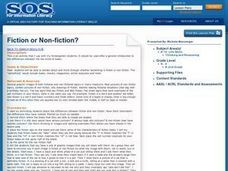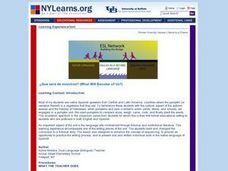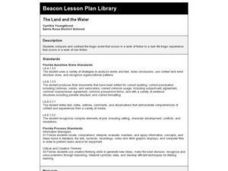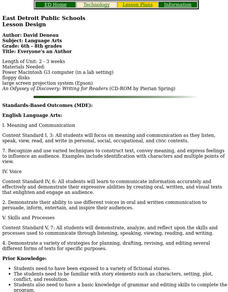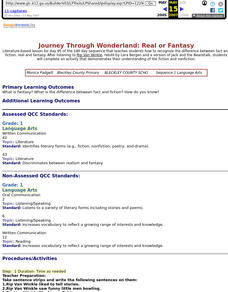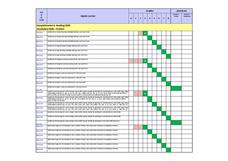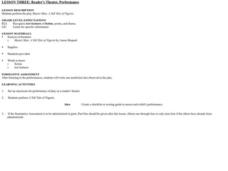Curated OER
Quality of Information: Point of View and Bias
Fifth graders identify stereotypes of Indian people based on perceived characteristics. They discuss the misconceptions. Students define quality of information and give an example from the story "Seaman's Journal: On The Trail With Lewis...
Curated OER
Building Fiction: Elements of a Short Story
Students define and interpret the elements found in a short story. Then they identify the elements of plot found in a short story. Students also apply knowledge of plot to an original work of fiction. Finally, they identify the...
Curated OER
Fiction vs. Nonfiction
Students explore fiction and nonfiction writing. They identify the elements of fiction in a short story and identify the criteria necessary in a nonfiction piece. Students distinguish the author's purpose in an expository text,...
Curated OER
Sherlock Holmes: Teaching English Through Detective Fiction
Students read examples of mysteries and detective fiction. With a focus on Sherlock Holmes, they are introduced to the techniques for reading properly. In groups, they define new vocabulary, make predictions and summarize the stories. ...
Curated OER
Catching on to Catcher in the Rye
Students conduct Internet research to analyze Holden Caulfield from the novel, the Catcher in the Rye. Once they have researched various sites to gain insight into Caulfield's problems, they write letters from one character to another. ...
Curated OER
Charlie and the Chocolate Factory
Fourth graders research and write an author report on Roald Dahl, including books written by him, birthplace, family life, and other information on his writing. Students read aloud chapters in the book. Students create a newspaper...
Curated OER
Real or hoax?
Seventh graders brainstorm a list of criteria that makes a webpage useful for research and not useful for research. They complete the activity, "Real or Hoax," and discuss fiction and non fiction stories and determine which websites are...
Curated OER
Fictional Hereos
Students are introduced to the definition of a hero. As a class, they compare and contrast the difference between non-fictional and fictional hereos they have read about. They read a story, create a story map of one of the heroes and...
Curated OER
Fiction or Non-fiction
Third graders view three texts, A DAY IN THE LIFE OF A FOOTBALLER, THE HUMAN BODY, AND WHICH IS WHICH? with the titles covered. They discuss whether the books are non-fiction or fiction and try to come up with suitable titles for the books.
Curated OER
The Art of Creating a Character Using a Press Conference
Students brainstorm and create list of traits of memorable fictional characters they have read about, write down ten characteristics about new character that they are going to create, discuss ways to make characters come alive, and write...
Curated OER
?Que ser de nosotros? (What Will Become of Us?)
Students discuss uses of a pumpkin. They fill out graphic organizers. Students listen as the teacher reads a story, and participate by repeating sounds the objects make as the story progresses. One student narrates the story while others...
Curated OER
Fiction Elements in Hatchet
Learners read or listen to Hatchet by Gary Paulsen, identify elements of fiction, develop writing, thinking, and organizing skills, and create PowerPoint slides based on the story.
Curated OER
An Anecdote is Worth a Thousand Pictures
Students identify anecdotes in speeches and the purposes that politicians use the anecdotes for. They create personal anecdotes for the class to hear, and students decide if the anecdote is real or fabricated.
Curated OER
The Land and the Water
Third graders read "The Land and the Water," a fictional short story and an article about John F. Kennedy, Jr. and compare and contrast fictional tragedy to a non-fiction tragedy. They fill out a Venn diagram and write an essay using...
Curated OER
Exploring Space Fiction
Students visit web sites with information on space fiction and collect information for their stories.
Curated OER
Everyone's an Author
Students examine variety of written pieces of quality fiction, discuss what different story elements are present and how those elements make stories as effective as they are, and create a class story.
Curated OER
Kid Lit Crit
Students explore different types of student literature; they then write their own fiction pieces, in either fantasy/adventure or memoir/realism style.
Curated OER
Journey Through Wonderland: Real or Fantasy
First graders recognize the difference between fact and fiction, real and fantasy. After listening to Rip Van Winkle, retold by Lara Bergen and a version of Jack and the Beanstalk, 1st graders demonstrates their understanding of fiction...
Curated OER
Summarizing Key Information
Students summarize information. For this language arts lesson, students summarize information from a fictional text. Students read a folktale and summarize the story.
Curated OER
Story Starters for Science Fiction Story
Students write creative science fiction stories. In this science literacy lesson, students develop their stories from a given set of starters.
Curated OER
Reader's Theater
Students perform a reader's theater. In this analyzing text lesson students perform Master Man: A Tall Tale of Nigeria, a play by Aaron Shepard. The students are assessed on their performance.
Curated OER
Reader's Theater, Rehearsal
Students rehearse a play. In this Reader's Theater lesson, students practice reading a play, Master Man: A Tall Tale of Nigeria by Aaron Shepard. Students discuss fluency, intonation, and volume when presenting.
Curated OER
Hoppy's Busy Day
In this reading comprehension worksheet, students read an Easter story titled Hoppy's Busy Day.Students then answer 4 reading comprehension questions.
Curated OER
School-Home Links: Fiction
In this fiction book activity, students read a book that is about make-believe people or animals and their lives. Students then write three things about the story that are make-believe. Parents or guardians must sign the activity.










